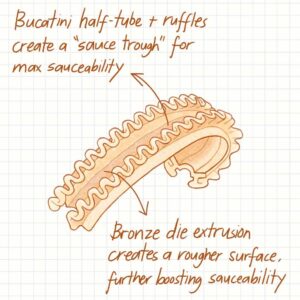In 2011, shortly before he became governor of the European Central Bank, Mario Draghi warned fellow Italians that Venice in the 17th century and Amsterdam in the 18th century planted the seeds of their collapse by putting elite privilege ahead of innovation. Corporate Italy can hang on to what is left of its sheen.
To which I would also ask, do you smell the gum leaves of Canberra in that quote?
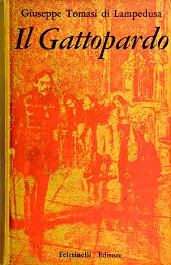 Draghi then goes on with a quote from “The Leopard”, where Prince Trancedi Falconeri says to his uncle Dom Fabrizio, “If you want things to stay as they are, things will have to change.”
Draghi then goes on with a quote from “The Leopard”, where Prince Trancedi Falconeri says to his uncle Dom Fabrizio, “If you want things to stay as they are, things will have to change.”
This is the last paragraph from an article published in the October 24th 2020 issue of The Economist about corporate decline in Italy. The article starts with an acknowledgement of that novel by saying, “Few works of literature capture the challenges of managing [societal] decay.”
If you read very slowly you might be able to detect that we too have a leopard who has learnt to change his spots at the next leap of leopards passing through the spin of his mind.
Waiting for Bliss
Last week I came across the word “bliss” – a word little used in these pandemic times, but once linked very firmly with “ignorance”. It is an old English word, and I would ask the readers, when could you genuinely say you had experienced a state of bliss?
What is a state of bliss? The definition varies from person to person. It is not wandering round in a trance; and it is not squatting on the floor and being told to meditate. It is not a set of rosary beads nor a set of bells – some may relate bliss to one or more of the senses – sitting in front of a log fire toasting marshmallows having come in from the icy cold and relaxing in a deep armchair drinking a suitably warmed glass of wine while listening to a the Tallis Singers’ recording of the Allegri’s Miserere. To me that is a suitable caricature of the meaning of bliss. This scenario can be explained in a conscious appeal to all the senses – extreme sensuality on a forgiving cliff face.
For me, bliss has always been unexpected. I was racking my brains trying to overcome the mist of ignorance to work through how many times in my life I have experienced bliss. Twice. Both were unexpected, and one instance came after a night in the Royal Women’s hospital student quarters in Melbourne back in the summer of 1962, and the other in 2002 all’aperto in Vancouver.
In one case I had experienced; and in the other I was waiting – in expectation. In both cases there was a woman involved – one in the past tense, the other in the future.
The summer of 1962 was the year when I just become engaged and where I used to sleep illicitly in the Hospital where my fiancé was doing her obstetrics term as a student. I used to leave the hospital a tick before six am and went over the road to a friend’s flat where he had a spare bed that I could “crash” on before going off for my job. For some reason, my friend was away. He had just finished an architecture degree and maybe it was a job out of town; I don’t remember but I would occasionally run into his cheerful flatmate over Vegemite toast and cup of tea.
This particular morning the sun was streaming into the room in his rented terrace, a comfortable bed and the record player with George Shearing playing “Folks who live on the Hill”. The album with a young woman with her black dress spread around her, demure smile, looking upwards. Drifting into sleep with this environment, this was bliss, a sense that it could never get better – the recent times provided that core requirement of optimism – the security of such optimism in the past, present and future tense which leads into that bliss, which you want to last forever.
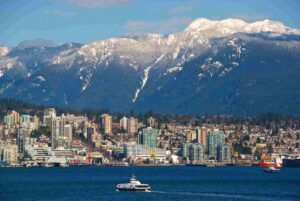
The second time, I was in Vancouver sitting outside, the weather was mild and I could gaze up at the mountains hidden partially by a scarf of sea mist. I was waiting for her to arrive, and the expectation of her arrival gave me that same sense of bliss. I did not sleep or even doze off, but had a very good Coho salmon. The wine was Washington State. That I remember, and unlike my normal approach, I ate very slowly and sipped rather than gulped. The mild temperature, open air, the food, the solitude among a late afternoon drinking mob provided the setting, but overall the expectation of seeing her that sealed the bliss. She was arriving later in evening from the other side of Canada.
Both were in good times, but this very juxtaposition of these two occurrences only has meaning when I paste them with those other vignettes which constitute life, so many of which do not have the same muted delicate colours which bliss has. Bliss is thus rare – at least for myself. I hope that in my last view of human experience I will be able to be full of bliss listening to Shearing playing Kern and Hammerstein, and with that expectation of seeing Her.
Another time; another Trek
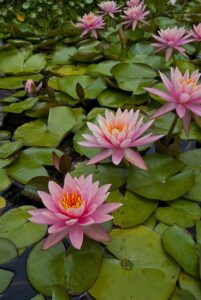
A few weeks ago, my blog charted our eventful course to China in the summer of 1973. The weather was foul in Beijing. There were floods and we were unable to go to the Great Wall as a result, but it was interesting times to be there, given the turbulent period China was going through at the time. I intend reviewing notes of the visit which are in one of my numerous archive boxes. As with our difficult journey to get there, leaving Beijing was no pool of lotuses either.
Our leaving Beijing when we did, produced one of the great regrets of my life. Unlike Gough, we did not meet Mao Tse Tung, but even though the Gang of Four were then in the ascendency and he was not, Chou en-lai was still a significant figure. The then Maltese Ambassador to China and also the High Commissioner in Australia – he was a shadowy figure but he kept popping up elsewhere – said that if we stayed another day he could arrange for us to see the great man. On reflection, there may have been a discussion with Stephen Fitzgerald, the Australian Ambassador, but my lasting impression was that it was a done deal but for one thing – we were on a tight schedule and on that schedule was a meeting with the Japanese Prime Minister Tanaka. In the scheme of things at the time, the meeting with Chou En-lai could not be fitted in. As I say, I still harbour that regret, to have missed meeting with one of the greatest men of the 20th century.
There was no direct flight from Beijing to Tokyo in 1973. The route would take us in a Chinese Ilyushin, as it turned out to be, to Guangzhou and then by train to Hong Kong, where we would fly to Tokyo. That was the plan, but this trip was one of the unexpected. The fellow travellers included the Chinese women’s volleyball team. That was unexpected; to see all these 1.8 metres tall Chinese women strolling down the aisle of the plane. As I reflected, I had lived in a world of stereotypes, and these young Chinese women were not that.
Then the fun and games started. We were forced to land at the then Henchow, and we were emptied out of the planes. Initially here was no information, and efforts to find out, even trying to contact the Australian Embassy in Beijing were unfruitful. So, all we had to do was wait. The flight crew parked themselves under the wing of the plane to get out of the sun.
The airport was on the outskirts of a village, which makes me think that although they gave us a name, it was not a major hub where we landed. The facilities were rudimentary and after a fruitless endeavour to get through to Beijing, I went for a stroll down to the village. After all, there seemed to be no security, and I had reached its outskirts, when I looked back and there was a soldier carrying a rifle running down the hill. It was clear from his gesturing that I was out of bounds. Although, he was smiling and his demeanour was surprisingly sympathetic to my venture, there were rules; and he escorted me back.
Otherwise, Geoff produced a football from somewhere, so the three of us entertained the few airport staff, the volleyball team who were standing at a distance from us on the tarmac and the aircrew under the wing. There seemed to be a cone of isolation around us. Nobody ventured near us. Not surprising when we could not speak Mandarin, and there was no Chinese minder travelling with us.
When the ball rolled over to them, it was treated as if it were a bomb. Nevertheless, these three Australians cavorting around in the sun with a strange looking ball had an audience. Geoff had been a champion schoolboy footballer, and Bill Snedden had played competitive football, as I had. Mine had been curtailed not only because of lack of skill but by my need for glasses, and the fact that contact lens technology was very primitive during my playing years. In a tussle to get the ball, Geoff showed the benefit of wide hips when he easily brushed me aside in competing for the ball. Playing on a hot airstrip losing one’s balance on such a surface reminded of the times I used to play sock football in the school’s brick quadrangle. The hands suffered as they hit the bricks.
Eventually three hot, mildly sunburnt blokes were motioned to join the plane. In retrospect, the Leader of Her Majesty’s Opposition, lost in Central China playing kick to kick on a distant tarmac, was a mildly amusing incident but today, a major political figure uncontactable in the wilds of China…well…
As we found later when we arrived in Guangzhou, the delay was due to a storm described as “monsoonal” passing through the city at that time. The air navigation instrumentation then was not equipped to enable any plane to land safely during such a storm.
Being completely “stuffed’, I have very little recollection of the city, except we were parked in a fine old hotel and the climate was subtropical. I remember the chintz curtains, looking out over lush tropical growth – the normal collection of monstera deliciosa and other undergrowth to which I could not put a name.
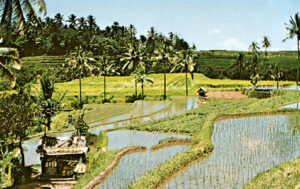
The next morning we were on the train to Hong Kong, and there were rice fields all along the rail line and the ubiquitous lychee trees in the middle of the fields.
Then we were across the border into Hong Kong, where we met up with Snedden’s wife, Joy, and had a relaxing time there.
I was left with the task of booking the flight to Tokyo. There were three alternatives BOAC, Alitalia and Air India. Given that forelock touching was the order of the day and there were people watching for aberrant republican behaviour, I chose BOAC. When guess what? Alitalia departed on time; BOAC was indefinitely delayed and Air India was about to leave. It was already taxiing out to take off when it was told to come back and pick up four Australians – travelling first class. Well, the revenue boost would have doubled that of the paying customers; there were only about ten others in economy, and it was the time before business class. Also, it was a time when a country to have its own national airline was all important. Prestige before profit in those days.
We were not late for the meeting with Prime Minister Tanaka.
Backroad out of Ceduna … Where next?
Given my love of Strahan, for many years we have owned a blackwood pole house there; if it were not for the trees we would have a view of Macquarie Harbour. We once had such a view but that has now vanished in an entanglement of blackberry and tea trees. Strangely this tangle disappears down the Esplanade where there is an uninterrupted water view from the ex-mayor’s house.
I have only watched the Backroads show once, when it visited the small Victorian town of Beaufort, so much part of my family life. I thought the program strange, focussing on quirky periphery. This must make good television because the ratings are said to be high and the program receives substantial support from the ABC. It plays to a belief system of the viewers, it doesn’t shock and it gave a view of Beaufort uncluttered by any relevance. Nevertheless, those pictured obviously loved their half-hour of exposure.
At the same time a substantial film, television and book stream about the Australian bush country provides a different picture – a dark foreboding scene, deeply crime-ridden country towns, where there is always some secret which the townsfolk know but won’t tell and where a serial killer stalks the unsuspecting city-slicker. This is a country, the background to horror stories, of empty houses, banging doors, and where you only see the feet and the flashing knife.
I have had the benefit of seeing much of Australia and, looking through the schedule of past episodes of Backroads, I’ve been to most of the towns featured, not just as a tourist but to work, and that has included spending time in Aboriginal communities. Hence, for instance when I watched that extraordinary portrayal of the Aboriginal relationship in the film Samson and Delilah, it was reality, slightly “doctored” but essentially reality – it rang true, not from what I had read or had been told, but what I have seen.
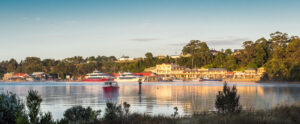
One of the challenges of being from “aways” is that it is important to blend in while realising that you are a “blow-in” and like all “blow-ins” you know it, they know it and, unlike the Backroads crew, when they pack away the camera, you from “aways” still have to live with the long time residents, and not be there just when the Macquarie Harbour is sparkling and the ocean is calm. The plaques around the foreshore remind of those alive how dangerous the seas are, but that was the risk of earning a living out in the Ocean.
The cinematography of Macquarie Harbour, the Southern Ocean and the accompanying rugged temperate rain forest with encircling mountains is brilliant. North barely seen are the two mountains, Heemskerk and Zeehan, the first 721 metes high, the second 684 metres. Both were seen by Abel Tasman when he sailed these two ships past the mountains in 1642. The mountains bear the names of those two ships; named by Bass and Flinders 1802 while circumnavigating Tasmania.
The Backroads episode provides this glorious perspective of the Wilderness, the Harbour, the Rivers and the Ocean. I agree, fantastic. I have flown with a mate in his twin-engined Cessna on such a day – from Strahan over the Gordon and Franklin Rivers to the Southeast Cape and then back over the Walls of Jerusalem. Let me say there are not many days which provide the perfect uninterrupted vista without being buffeted around the sky by the powerful winds, because these are the “Roaring Forties” where the storms roll in with the greatest intensity.
“Backroads” has essentially a tourist view of Macquarie Harbour, two of the major rivers the Gordon and the Franklin, and the Southern Ocean. The King River, flowing as it does from Queenstown, being cleansed from metal pollution gets very little mention – maybe 12 years ago when the powerboat was taking people on adrenalin leaching trips up the river, it may have got a mention. But then the seaplane has gone too and the train which runs on the Abt railway gets not a mention, presumably because the engines were being overhauled. Yet that railway among others is essential to the Strahan narrative, otherwise if it were running why ignore the original lifeline after the convict settlement had gone.
Heather Ewart, the presenter, is pictured on the steel ketch “Stormbreaker”, drifting down the Gordon river; Heather Ewart on Sarah Island, a ruined convict settlement full of gore where the tourists are dropped off for a quick exposure to the horror that was; Heather Ewart as a walk-on participant in “The Ship that Was”, a long running sketch about adventurous escaped convicts, staged in a theatre setup on the wharf.
She is there interviewing a couple of young Aboriginal women from “aways” picking up shells on the beach. Mate, there are middens on the West Coast but not there where the full fury of the Ocean storms would have washed them away eons ago. Eventually, the show ends up in the woodworks, but not before we see Bob Brown, the Saviour of the West Coast wilderness and the film clips from that campaign so many years ago; the whales more recently stranded on the Ocean beach, and then for a piece of trivia, a waterskiing event to break some concocted world record for the most water skiers at any one time. May I say I have never seen waterskiing on the Harbour as a regular activity. It is just too rough.
Picture postcard maybe; emphasis on the Wilderness, the magnificent scenery but except for a short reference to huon piners, not much about Strahan. Strahan does not exist because it is perched on a large, picturesque harbour. It was a port for the mines of Queenstown, on the other side of the West Coast Range – an isolated settlement set in the most beautiful part of Australia. People did not go there to admire the beauty; they went there to work. And the question is why – and why have they stayed?
While the background may be beautiful, the living conditions are harsh – but not the day that Heather Ewart blew in with her entourage. The opportunity missed of how a town has reconciled itself to the need to conserve when the genesis of the township was to exploit Australia. Isn’t that more the dilemma of modern Australia rather than the extent of the line of water skiers on the Harbour?
A hardy, resourceful community which has adapted – that has been my privilege of being a person from “aways” to know Strahan – to experience more than one sunset.
Somebody told me the week before Backroads was about the towns of the Dunmunkle Shire in the Wimmera. Now that is a place I know very well, particularly Minyip. Maybe I will look at what they have done with those townships.
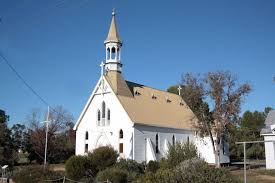
Special Pleading?
Let me give this person privacy. However, I have heard of a woman who was in remission from her disease of polymyalgia rheumatica and, having submitted to the AstraZeneca vaccine, promptly got an exacerbation of the disease, which has persisted.
The problem with polymyalgia rheumatica, nobody knows what causes it, whether it is a vasculitis or myopathy. What is known is that it occurs in older age groups and is associated with osteoarthritis and, in a number of cases, with another autoimmune condition, called temporal arteritis – a condition of the artery supplying the temple region. If not treated temporal arteritis can lead to blindness. This is patently a disease of a blood vessel.
Polymyalgia generally resolves by two years after diagnosis, which is complicated by the stealthy onset of the disease. Therefore, the onset is difficult to pinpoint. However, with me it burst out into a florid state of muscle pain, extreme weakness and stiffness of joints. In its untreated state one has the premonition of death, holding onto the basin in the bathroom and seeing the world disappearing from view – but trying not to let go. That is what occurred to me. After seven years the disease is chronic – I shall die with or because of the disease. The more the disease is stimulated by outside influences, the more it will shorten my life.
Treatment is cortisone, and it is in this titration of the amount of cortisone that provides symptomatic relief. Methotrexate did nothing. Without cortisone, it is simple. I would be dead by now.
In the initial fulminant state, there is in addition to the indicators of infection, an indication that platelet function has been disturbed. In this particular case there was a marked thrombocytosis. Platelet problems are at the heart of the AstraZeneca side effects.
Being on cortisone therapy for over seven years means that adrenal function becomes compromised, well demonstrated when the replacement cortisone was at point where it could be expected for the home grown cortisone to kick in if there was stress. My adrenals did not kick in, and I experienced symptoms of hypoadrenalism.
Therefore, living on the edge should not be challenged by a vaccine which has its own problems, even if they are downplayed. Yes, I have had my influenza inoculation for 2021; yes I had my shingles inoculation several years ago. None provide 100 per cent protection; and indeed I have a mild reaction to the influenza inoculation; no pain at the site but a slight feeling of unwellness with upper respiratory symptomatology for several days. Symptomatically, my polymyalgia has got worse.
But then I am a doctor once a medical researcher and public health physician. The soothing words saying “do not worry” are not here crashing on a shore devoid of information. The case can be argued that it would be better to avoid the risk. However, in a country where choice is limited to who you know, well why not ask that I be given the Pfizer vaccine by my public health physician peers.
However, if my request is refused, maybe I will have to consign myself to the line of AstraZeneca injectees, with all the hollow assurances, but knowing that I am especially vulnerable to admittedly rare significant side effects.
If this insistence on AstraZeneca occurs, then I will post a daily message on social media telling everybody 24 hour by 24 hour how well I am going – and for Government “come in spinner.”
The coins are about to be tossed. The chances are of (a) no complications; (b) side-effects with the ultimate government prize of my death; or (c) putting the kip down and allowing me to have the Pfizer vaccine and of course my daily diary of how that vaccine is treating me.
Then of course I could not have the vaccine and die of that wonderful phrase “natural causes”; better than “misadventure”.
Mouse Whisper
I am entering into the world of invention. This invention threatens to take over the world, so they say. It is an American invention. It is a new type of pasta that is sweeping the trattorie of New York. There are 300 different types of pasta and yet for this new one, people have to wait for 12 weeks to get a packet of the new pasta, and then it costs USD18.00 plus postage. It is called “cascatelli” in reference to the Italian word for waterfall.
To me, the ravenous mouse, the pasta resembles a caterpillar, but this pasta is said to be able to capture ragu or vongole jetsam which may be drifting by in the sauce, flooding the pasta dish. This is the secret, opening up the tube and having pincer pasta pseudopodia able to clutch and not to let go of the tidbit onto your shirt (or in my case my mousling bib) but finding the safety of your mouth.
In Australia you can buy similar pasta, where the tube is closed, called creste di gallo – “coxscomb”. This pasta sells for about AUD$5.00.
As The Washington Post reports:
But it is the technology of opening the tube and having the right template that has the culinary world agog.
There’s no wrong sauce for this pasta. Every kind clings like Velcro.
“It’s like a Venus fly trap. Anything that goes in there can’t get out.”
The pasta’s marketing materials refer to that grippy-ness as “sauceability.” Alongside “forkability” and “toothsinkability,” these goofy, made-up terms form the inventor, Dan Pashman’s trifecta of ideal pasta characteristics.
Ugh, that is sufficient mangling of the English language – bit like pasta.
